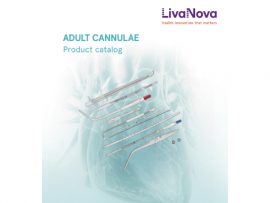Abstract OBJECTIVES Chronic kidney disease can develop as a long-term complication after cardiac surgery—a condition associated with increased risk of new cardiovascular events, readmissions and mortality. Diagnosis is often delayed,..
Read MoreTopic: Pre hospital ECPR & role of perfusionist
Read MoreChères Consœurs, Chers Confrères, Cher(e)s Ami(e)s, Les 4 et 5 décembre 2025 se tiendra à Bordeaux la 13e édition des Journées Consensus, Actualités et Perspectives en Suppléance d’Organes (CAPSO). Devenu..
Read MoreBilateral Robotic Lung Transplant as well as lung Procurement and usage of EVLPD for the borderline Donor Dr.Sam Zeraatian Nejad Davani,Attending Professor of Cardiovascular Surgery and Head of..
Read MoreAbstract Objective To investigate the impact of body mass index (BMI) on neurologic outcomes in venoarterial extracorporeal membrane oxygenation (VA-ECMO) Design Retrospective observational study Setting Single center Participants Adults Interventions..
Read MoreAbstract Introduction Cardiac surgery in infants often triggers a severe inflammatory response. The role of biomarkers in predicting clinical outcomes in this group of patients has been debated in the..
Read MoreAbstract BACKGROUND Cardiopulmonary bypass (CPB) is a life-support technology widely used in surgery. Review articles reflect research advances in a certain topic or field within a certain period of time...
Read MoreAbstract Solutions to reduce the need for systemic anticoagulation during extracorporeal life support would improve safety and utility. The study objective was to evaluate the safety and efficacy of a..
Read MoreAbstract Importance Acute kidney injury (AKI) after cardiac surgery is a common and serious complication. Protein loading appears nephroprotective; thus, continuous hyperoncotic albumin infusion may impact AKI following high-risk cardiac surgery...
Read MoreAbstract Midazolam is a commonly used sedative for patients on extracorporeal membrane oxygenation (ECMO). However, its long context-sensitive half-life is of concern. Remimazolam may be a suitable alternative. This study..
Read MoreAbstract Background Immediate initiation of extracorporeal membrane oxygenation (ECMO) has not demonstrated benefit in individuals diagnosed with cardiogenic shock based on the presence of hypotension. The relationship between other hemodynamic..
Read MoreAbstract Objectives: This study aimed to measure the incidence of postoperative delirium (POD) after aortic arch surgery with hypothermic circulatory arrest (HCA), compare it to cardiac surgeries not requiring HCA, and..
Read MoreAbstract Purpose review To discuss the hemodynamic monitoring techniques to quantify cardiac output, to assess the adequacy of perfusion, and to evaluate cardiac as well as pump preload and fluid..
Read MoreAbstract BACKGROUND Veno-venous extracorporeal membrane oxygenation (V-V ECMO) is a lifesaving intervention for severe respiratory failure; however, its effectiveness depends on accurate cannulation-patients with anatomical variations present with significant challenges..
Read MoreAbstract Introduction Extracorporeal membrane oxygenation (ECMO) is an established therapy that supports a patient in respiratory or cardiopulmonary failure to recovery, transplant, or durable mechanical support. Prompt referral by the..
Read MoreAbstract Microbiome analysis using metagenomics next-generation sequencing (mNGS) is rarely performed in patients receiving extracorporeal membrane oxygenation (ECMO). Patient body sites were swabbed within 72 hours of ECMO cannulation and..
Read MoreAbstract Background A systemic inflammatory response can contribute to poor outcomes in an advanced stage of cardiogenic shock (CS). We investigated the efficacy of extracorporeal endotoxin and cytokine adsorption using..
Read MoreAbstract Extracorporeal membrane oxygenation (ECMO) is an important rescue strategy for neonates with severe cardiorespiratory failure, yet its role in the management of hypoxic–ischemic encephalopathy (HIE) remains subject to debate...
Read MoreAbstract The femoral vein is frequently used for central venous access during extracorporeal membrane oxygenation (ECMO). Accidental cannulation of the ascending lumbar vein (ALV) during ECMO has rarely been reported...
Read MoreAbstract To evaluate the impact of hospital-acquired infections ( HAIs ) on the prognosis of neonates treated with extracorporeal membrane oxygenation (ECMO) and analyzing related prognostic indicators, we conducted a..
Read MoreAbstract Objectives Antithrombin (AT) deficiency is considered the primary cause of heparin resistance (HR); however, some patients with HR have normal AT activity (AT-independent HR). Supplementation with concentrated human AT..
Read MoreAbstract Cardiac surgery with cardiopulmonary bypass (CPB) may lead to many postoperative complications. However, many complications cannot be predicted in time using the current clinical methods, or the prediction is..
Read MoreMechanical Circulatory Support Devices
Read MoreAbstract OBJECTIVES Current preoperative counselling in neonatal cardiac surgery is mainly focused on the primary procedure. However, other factors must be considered when evaluating the surgical risk of a neonate...
Read MoreAbstract This study focuses on the fluid dynamics of a blood pump used in extracorporeal membrane oxygenation (ECMO). In ECMO, the patient's blood is pumped through a circuit composed of..
Read MoreAbstract Purpose This study examined the pressure drop across several LV vent catheters commonly used in adult and pediatric cardiac surgery to identify optimal vent catheters for different flows that..
Read MoreIn modern cardiac surgery, cardiopulmonary bypass (CPB) plays a life-saving role. It allows the heart to be stopped safely while the body is perfused with oxygenated blood. However, it’s a..
Read More1. Introduction Sickle Cell Disease (SCD) is a chronic, inherited blood disorder resulting from a single point mutation in the β-globin gene. This mutation leads to the production of hemoglobin..
Read More




















